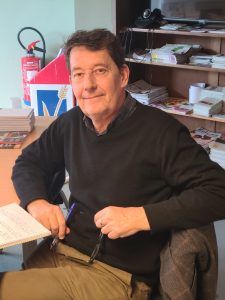- Cambodia
How would you evaluate your first year as Director in Cambodia?
How would you sum it up?
It’s a positive assessment. First of all, in terms of the working relationships established with the teams on site. It was very easy to make contact. When I arrived in Phnom Penh, I found colleagues who were extremely motivated and committed to their work, and who had the technical and communication skills that enabled them to monitor and implement programmes with a wide range of partners. This was true for the colleagues working on the programme side, but also for the colleagues in charge of administration and finance, who came from two different NGOs, Louvain Coopération and Eclosio. I did not encounter any particular challenges in aligning procedures, harmonising working tools and, in general, in managing and implementing the programmes of the two organisations. Relations and communication with the team went very well. And that’s really the positive point I want to make.
Can you share with us a highlight of the past year?
There were several of them. The highlights are the ones we experience when we go out to meet our partners in the field. The first that spring to mind are the visits to farmers’ organisations, and the meetings with the presidents of the agricultural cooperative unions we work with. This took me to Takéo, Kampong Thom and Battambang, the three provinces where our sustainable food systems programme is based. These visits give us the opportunity to meet our partners on the ground, to discuss their difficulties and their perception of the problems, and to work with them to identify solutions to improve their conditions. These are all particularly enriching moments in our work, even if there are others.
Have you encountered any difficulties or challenges over the past year?
Many, but we’re also there to tackle them and resolve them, to overcome them. An organisation like Uni4Coop and Cambodian farmers’ or civil society organisations work together to learn from each other. The key is to be very clear at all times, to agree on what we want to achieve together, to provide adequate resources and appropriate means, and not to hesitate at any time to talk about the problems we encounter. Sometimes we may think that everything is going well, and then, in the course of a meeting, realise that we are moving away from our objectives or that we are not really making progress. So I think we have to be very realistic and in regular and frequent contact with the partners, and we have to implement activities jointly, so that we are aligned and working towards the same goals.
What are the prospects and key moments ahead for the rest of the programme?
Most of the agreements have been signed and partnerships and collaborations are therefore underway, even if some are more fragile than others. But as funding is not yet sufficient to cover or implement all the programme’s activities, one of the priorities is to mobilize resources in addition to those we have already obtained. This means mobilizing the co-financing we need to implement the programmes, and possibly increasing the scope of our activities with additional funding. So I believe that mobilizing resources will be one of the main challenges for the next two or three years.